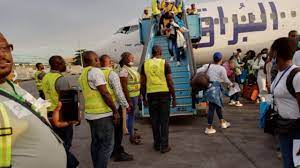Foreign News
Migrants Should Apply, qualify for Asylum from Home Before Coming to U.S. – Biden

Majority of migrants crossing the border with the U.S. are immediately sent back, so the better option for them would be to apply for asylum from home countries and check whether they qualify before coming over.
U.S. President Joe Biden said this in an interview with ABC News on Wednesday.
“Let’s get something straight though.
The vast majority of people crossing the border are being sent back. Immediately sent back,” Biden replied after being asked if he welcomes migrants in the US.According to Biden, the new administration prioritises setting an organisational structure that would allow to house unaccompanied children and help them find their parents, creating facilities “in place” for asylum applications and otherwise taking control of “the mess that was inherited.
”“I can say quite clearly — don’t come over. And the process of getting set up, and it’s not going to take a whole long time, is to be able to apply for asylum in place.
“So don’t leave your town or city or community.
“We are going to make sure we have facilities in those cities and towns run by DHS (Department of Homeland Security) and also access with the HHS, Health and Human Services, to say you can apply for asylum from where you are right now,” Biden stressed.
However, as the president told ABC News, the main goal of the U.S. in handling the immigration crisis is to address the root causes of mass migration — violence, natural disasters, and poor economic conditions in the home countries.
Biden has consistently criticised U.S. President Donald Trump’s administration’s hardline policies, especially the controversial “zero tolerance” policy under which federal authorities separated children from their families after they illegally cross the border.
Parents were sent to federal jails to await their hearing, while children stayed in shelters operated by the Department of Health and Human Services.
The policy has been reviewed after receiving massive backlash, but hundreds of migrant children reportedly still remain separated from their families. (Sputnik/NAN)
Foreign News
ICJ Begins Hearing on Israel’s UN Agencies’ Restriction in Gaza
The International Court of Justice (ICJ) has started hearing on Israel’s continuing severe restrictions on the work of the UN and other international organisations in Gaza.The ICJ, which sits in The Hague and is the UN’s top court, is expected to hear from 40 states and four international organisations in proceedings slated to last all week.
Representing Secretary-General Antonio Guterres, UN legal counsel Ms Elinor Hammarskjöld reiterated Guterres’ many calls for a ceasefire, for humanitarian aid to reach all people in need and for all hostages to be freed. A total of 13 UN entities are present in Gaza, Hammarskjöld noted, adding that 295 UN personnel have died in Gaza since the war began on 7 October 2023, following the Hamas-led terror attacks in southern Israel.The UN legal counsel insisted on the special protections and immunities of UN agencies and personnel needed to implement its mandated activities all over the world, including in the said territories.These protections also apply during armed conflict, Ms. Hammarskjöld said, before highlighting Israel’s obligations as the occupying power under international law.“The overarching obligation is to administer the territory for the benefit of the local population and “to agree to and facilitate relief schemes.“In the specific context of the current situation, these obligations entail allowing and facilitating all relevant UN entities to carry out those activities for the benefit of the local population,” she said.The purpose of the hearings at the ICJ all this week is to establish what’s known as an “advisory opinion” on Israel’s obligations as the occupying power in Gaza and the wider territory, in accordance with the UN Charter.It follows a meeting of the UN General Assembly in December where Member States voted 137 to 12 to seek the view of the ICJ’s 15 judges, amid ongoing Israeli bombardment and dramatic aid shortages across Gaza.The ICJ judges’ advisory opinion is not binding as opposed to the legal disputes between countries on which it rules (so-called “contentious cases”)It, however, provides clarity on legal questions.Once the court has issued its opinion, the General Assembly would be open to pick up the matter again and decide on further action.Welcoming the hearings, the head of the UN agency for Palestine refugees, (UNRWA) Philippe Lazzarini, insisted that aid agencies were working “to address overwhelming needs”.The UNRWA Commissioner-General explained that the Israeli Parliament’s widely condemned “no-contact” policy banning any coordination with UNRWA official had obstructed the delivery of essential relief services and aid.The move is particularly significant because UNRWA is the largest aid agency in Gaza, where it has provided health, education and other vital public services for decades.But since these restrictions came into effect at the end of January, UNRWA international staff have not received visas to enter Israel, Lazzarini said.Inside Gaza, meanwhile, ordinary Gazans continue to face desperate food shortages linked to the 2 March decision by Israel to seal the enclave’s borders.“Today people are not surviving in Gaza, those that aren’t being killed with bombs and bullets are slowly dying,” Jonathan Whittall, local Head of Office for the UN aid coordination wing, OCHA said.He insisted that humanitarian agencies were unable to meet soaring needs following Israel’s decision to cut all commercial and relief supplies.“People here are being suffocated. What we see around us is endless suffering under a total and complete blockade.“It is a total closure that’s now lasted for almost two months while airstrikes, ground operations are intensifying and displacement orders that are pushing people out of their homes are increasing,” he said.(NAN)Foreign News
Nigeria Condoles Iran over Deadly Explosion

The Federal Government has condoled with Iran following an explosion that claimed 28 lives and left over 800 people injured. The Minister of Foreign Affairs, Amb. Yusuf Tuggar, conveyed the condolences in a statement issued on Sunday by Kimiebi Ebienfa, spokesperson for the Ministry of Foreign Affairs.
The explosion occurred at Shahid Rajaee Port in southern Iran, near the Strait of Hormuz, on Saturday. Tuggar stated, “The government extends its deepest condolences to the Government and people of the Islamic Republic of Iran following the devastating explosion. “Nigeria stands in solidarity with Iran during this difficult time and shares the grief of families who lost loved ones in the unfortunate incident. “We commend the swift response of emergency services and encourage continued efforts to assist the injured and affected communities. “Our thoughts and prayers are with the victims, their families, and the entire nation of Iran.” (NAN)Foreign News
ECOWAS Convenes Meeting in Ghana on Withdrawal of Niger, Mali, Burkina Faso

The Economic Community of West African States (ECOWAS) Council of Ministers has convened a meeting in Accra, Ghana, to deliberate on the withdrawal of Niger, Mali, and Burkina Faso from the regional bloc.
The Chairman of the Council, Nigeria’s Minister of Foreign Affairs Amb.
Yusuf Tuggar, made this known in a statement issued by Alkasim Abdulkadir, his Special Assistant on Media and Communications Strategy.“The Extraordinary Session follows directive from the Authority of Heads of State and Government during its 66th Ordinary Session, mandating the Council to adopt modalities and a contingency plan for the disengagement of the three Sahelian nations.
“The ECOWAS Commission is expected to present memoranda addressing the withdrawal process, suspension of programmes in the affected countries, and challenges related to the free movement of people, goods and services.
“Additionally, the Council will examine the potential relocation of ECOWAS institutions and agencies currently based in Burkina Faso, Mali and Niger with an eye toward mitigating any disruptions caused by their exit,” Tuggar said.
He said the session marked a difficult moment in ECOWAS’s history, adding it was never the community’s wish to deliberate on the withdrawal of member states.
“In recognising the sovereignty of these nations under their current military governments, we must now adapt and chat a forward-looking path”.
He urged the ministers to embrace institutional renewal and recommitment to regional integration, emphasising ECOWAS remain the most integrated regional bloc in Africa, underpinned by harmonised policies and shared vision for political, economic and security cooperation.
“As we look ahead, our responsibility is to maintain the ECOWAS legacy and pass it on stronger to the next generation. Our unity has been tested before and we emerged stronger. We will do so again,” he stated.
The chairman of the council stressed the need for the ministers to engage in constructive deliberations and ensure the effective implementation of the countries withdrawal, reaffirming ECOWAS remain the premier platform for tackling West Africa’s collective challenges.
“Membership, as the saying goes, has its privileges,” he added.
He expressed appreciation of member states to the government and people of Ghana for their hospitality in hosting the critical session on sideline of the inauguration of “ECOWAS@50” celebrations.
The minister described the commemorative activities as timely reflection of the bloc’s achievements and aspirations, saying the gathering demonstrated unwavering commitment to advance the sub-regional community and fulfill ECOWAS’s core purpose.
NAN reports that on Jan. 29,Burkina Faso, Mali and Niger formally withdrew from the regional bloc.
The military-led governments in the three West African nations decided to withdraw from the bloc, and formed their own security alliance, the Alliance of Sahel States, in September 2023.
With the withdrawal of the three states, ECOWAS now has 12 members. (NAN)























